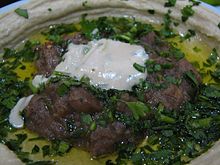Lose Weight with a Mediterranean Diet
 The Mediterranean Diet offers healthy, tasty fruits, vegetables, whole grains, nuts, fish, and olive oil while sharply reducing intake of milk products, meat, processed foods, and sweets. It prevents cardiovascular disorders, reduces the incidence of cancer and diabetes, and curbs neurodegenerative processes. Yet, in spite of the pressing need to confront the global obesity epidemic, the MD has received relatively little attention in regard to its potential for weight loss.
The Mediterranean Diet offers healthy, tasty fruits, vegetables, whole grains, nuts, fish, and olive oil while sharply reducing intake of milk products, meat, processed foods, and sweets. It prevents cardiovascular disorders, reduces the incidence of cancer and diabetes, and curbs neurodegenerative processes. Yet, in spite of the pressing need to confront the global obesity epidemic, the MD has received relatively little attention in regard to its potential for weight loss.
The MD is not really a diet at all in the sense of a way of reducing energy intake in order to reduce weight. It is rather a traditional cuisine—a mode of ordinary healthy eating. And it contains no agreed-upon prescriptions regarding portion size or the exact balance of various ingredients.
Nonetheless, the MD performs splendidly at the very task that is the downfall of other diets: it possesses proven effectiveness as a way of maintaining weight. In almost every clinical trial of medical and commercial diets, the loss of some 2-14 kg over the first 6-12 months gradually gives way to regaining weight, so that after a while the dieter is no better off than at the outset. In contrast, the palatability of the MD, its satiety-inducing ingredients, its natural appeal, its myriad suppliers and recipes, and its freedom from the calorie counting, weight worrying, expense, and counseling typical of other diets make it much easier to pursue over the long term.
Studies show the MD’s effectiveness in weight maintenance (Esposito K et al. Metab Syndr Relat Disord. 2011 Feb; 9(1):1-12). For instance, in a recent three-pronged Israeli study (Shai I et al. NEJM 2008), a loosely defined Mediterranean Diet maintained weight loss of about 4.4 kg from months 5 through 24 of a trial, whereas a low-fat diet group regained about 25% of weight lost in the first 5 months. There is also intriguing evidence that moderate red wine consumption prevents body weight gain, at least in rats (Vadillo Bargallo et al. J Nutr Biochem 2006). Thus dieters who lose weight from any other diet should then switch over to the MD to maintain the weight reduction.
Many people prefer the MD because it provides normal nutrition instead of reducing caloric intake (though that is an option). In contrast, low-calorie diets fare relatively poorly in inducing satiety, so dieters often deviate from their prescriptions or abandon them entirely. Olive oil’s gustatory virtues plus spices help turn eating vegetables (the healthiest food of all) from a chore into a highly desirable activity.
Evidence regarding weight loss with the MD is more fragmentary. An Italian pilot study (De Lorenzo A et al. Diab Nutr Metab 2001) of a low-calorie, rather well-defined MD in 19 obese women found that they lost 6.6 kg on average over two months. So a low-calorie MD seems to work quite well for losing weight in the short run, and then it can be adjusted to normal MD intake for the long run.
The MD and Exercise Regulate Metabolism
The 1950s rural Cretans, the original models of the MD, walked a lot. After gaining weight when hobbled by a leg injury, this writer lost 10 pounds (4.5 kg) in 10 weeks down to his optimal weight simply by adhering to a filling, satisfying ovo-lacto-vegetarian MD and doing a great deal of low- and moderate-intensity exercise, mostly walking at 3 miles an hour.
This suggests that, instead of restricting caloric intake with the MD, one should just eat a satisfying MD and do plenty of light and moderate exercise and physical activity (Zone 2 intensity such as walking at a good pace or slow jogging that burns fat and slowly reduces weight).1 Aim at getting into shape rather than at losing weight. Instead of counting calories, focus on selecting and enjoying the correct MD food while steering clear of processed food and junk food. Also, avoid deviations from the traditional MD diet like sausage or huge slabs of cheese on pizza.
Eating the right food will not get quick results, but it will make sense to many medical doctors and to millions of overweight and obese people disappointed with other diets.2
See also: Eat a Mediterranean Diet but Still Supplement?
*****
Kenneth J. Dillon is a historical and scientific researcher. See the biosketch at About Us. Dillon jogs, walks, lifts weights, performs cardio exercise, and eats an ovo-lacto-vegetarian Mediterranean Diet. He has added high-protein food to his diet, which lessens hunger. Weight lifting can build lean mass and reduce fat.
